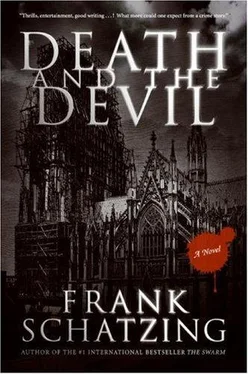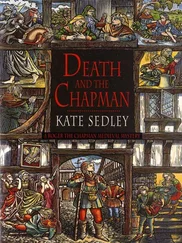Fury blazed up inside him. Enough was enough. He was fed up with taking evasive action, running away, spending his whole life on the run. Fed up to here!
Then, just a few yards before the left turn down to the Rhine, he saw a passage open up between the houses.
He had a vague memory that it went to Bethlehem Chapel, a tiny church belonging to one of the neighboring properties. And if his memory was correct, the passageway led to a narrow alley overgrown with weeds and bushes, which branched out into a tangle of footpaths through the convent vineyards. He had been there once. The area around the chapel was neglected, the walls and fences broken in places, so that it was easy to get into the vineyards.
Where he could escape. In the thick undergrowth even this fiendishly swift pursuer couldn’t catch Jacob.
He kept running until he was almost past it. Then he suddenly darted to the left and skidded into the passage. He nearly left it too late. As it was, his shoulder scraped painfully along the wall. The regular pounding of the footsteps behind him faltered. The other was having to brake, losing time. Jacob had increased his lead slightly; now everything depended on his sense of direction.
At first all he could see was dense blackness. Then the faint outlines of the trees and the chapel emerged.
And something else.
Jacob couldn’t believe it. This wasn’t the alley he remembered. It ended in a high wall. There was no way out. His memory had deceived him.
The footsteps behind were swift and regular again. They were getting closer. If something didn’t occur to him soon, he might just as well stand there and wait.
Just a minute! That wasn’t a bad idea.
Jacob gasped for breath. He could almost feel the bolt in his back. Without looking, he sensed the other raising his crossbow, already celebrating his victory.
With his last ounces of strength he put on a spurt, despite the wall in front.
Then he suddenly braked, swung around, and ran straight at his pursuer.
Johann climbed up the stairs, then stood, irresolute, outside the magnificent door. The flickering light of the candle brought the rich carving to life. As a child he had often stood looking at it, not long after his uncle Gottschalk had found the carved and inlaid wood in a Florentine warehouse and brought it back. It came, so it was said, from Byzantium and had fallen into the hands of Venetian knights during the first Crusade. Often, if the light was right, old ships would sail across an ocean of darkly grained wood, monsters and demons crane mahogany necks, and gargoyles with knotholes for eyes and worm-eaten teeth grin down at him, while cherubim and seraphim, on wings of walnut and ash, flew over them and the Holy City glowed in pure ebony on the horizon, such a glorious sight that he blushed with shame not to be one of those fighting to liberate it.
But then he had been a boy, his head full of ideals.
Now he was getting old, almost fifty. He had not been on a crusade, yet he had seen more of God’s creation than many of the self-appointed liberators who lay waste to the world in the name of God, then wasted away themselves in Seljuk prisons or suffered torture in Pecheneg dungeons, their heads impaled on lances lining the entrances to heathen strongholds. Johann’s spiritual ideals had taken a backseat to the study of profit and loss, but he never forgot to repeat the Psalm Have mercy upon me, O God, and to look on his wealth with due modesty.
He would establish a church, he swore for the nth time, and commission an altarpiece for it, a huge crucifixion on gold leaf. He’d start to make the arrangements as soon as the worries, doubts, and sleepless nights of the next few days were over. At the moment he had other things on his mind.
He knocked and entered the room beyond the door.
The old woman was sitting in the dark, but she was awake. Johann knew she hardly ever truly slept. Blindness was sleep enough for her, a sleep in which she could enjoy again the scenes from her life when she was young and held court with Werner, long since dead and almost forgotten. Their banquets were famous as far away as London, Paris, Rome. She had entertained Roman cardinals, seen rich merchants from Cornwall dancing in the great hall and gentlemen from Flanders with tall hats and full purses go down on their knees before her. She had been admired for her business acumen, respected for her keen mind, and desired for her great beauty.
All that was in the past.
And yet she did not live in the past but in the here and now. Beneath her sunken lids she saw into the future, and sometimes it seemed she saw much more than all the others who had eyes to see.
Johann sat on the edge of the chair opposite her, putting down his silver candlestick. He stared silently at the flame.
After a while she leaned forward slowly. In the glow of the candle her face seemed carved out of marble. Despite the closed eyes and deep furrows, one could still feel the fascination she must have exerted. It was almost like looking at the death mask of a very old, very beautiful woman.
“Something’s wrong,” she said in a hoarse whisper, all that was left of her rich, melodious voice, dry leaves blown along the walls by the wind.
Johann placed his fingertips together. “Yes.”
She gave a sigh, scarcely audible. “You don’t believe in our cause anymore?”
He shook his head as if she could see. “That’s not it, Mother. I believe in it more strongly than ever. What we are doing is right.”
“But you have doubts about the alliance.”
“Yes.”
“Hmm.” The white fingers set off across the black velvet of her dress, sought out and clasped one another. “Gerhard Morart is dead. He had to die. Not because we are cruel—because I am cruel—but because our cause demanded it.” She paused. “But there are some in our company who do not seem to understand that. The fools think they can go through fire without getting their feet burned.”
“We all come to the fire,” said Johann softly. “Sometime or other.”
“Of course. But what is pleasing in the sight of God and what is not? Have you ever thought how arrogant it is to claim to know God’s will and dispense justice in His name? When not even the pope can prove he is truly a servant of God. If the ways of the Lord are beyond finding out, as the Bible teaches, then perhaps it is the pope who is an abomination in the sight of God. Who, then, is more likely to burn? The man who questions the authority of the holy Catholic Church or the so-called Holy Father?”
“That seems to me a question no mortal can answer.”
“Nor can we interpret God’s word to suit ourselves. Do not torment yourself unnecessarily, my son. You will not find the answers we are looking for in this world. But since we cannot know , does that mean we must not act?”
“We will act,” said Johann determinedly.
The parchment skin tautened around the old woman’s teeth. She was smiling.
“But I would be happier,” he went on, “if I had better troops at my command. I don’t share Matthias’s fears about Heinrich von Mainz—Matthias sees danger everywhere—but there are others.”
“Yes, I know.” She lifted up her head and jutted out her chin. Her nostrils quivered as if she were trying to identify some faint odor. “You’re worried about Daniel. He’s a hothead. He’ll kill someone one day.”
“Or get killed. Daniel is a risk to the family.”
“I’m more concerned about Kuno.”
“Yes.” Johann sighed wearily. “Kuno’s the other one I had in mind.”
“But we cannot condemn Kuno because it is his heart speaking. Gerhard Morart dandled him on his knee. Kuno wanted to become a stonemason like him. When Gerhard became a journeyman, Kuno pestered his father to be allowed to accompany him, even though he was only a little boy, a very little boy who had only just learned to speak, never mind think for himself. He loved Gerhard above all else.”
Читать дальше












